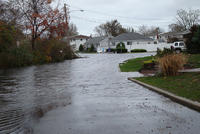-
Part Two: NNSA and private contractors’ “nuclear safety culture” responsible for Y-12 security breach?

After Sister Susan Rice, age 82, and two other senior confederates allegedly broke into the Y-12 National Security Complex at Oak Ridge, Tennessee on 28 July 28th, initial spin on the breach at this highly secured facility focused upon blaming a lone security guard;the security breach at Y-12, however, should be more accurately understood as revealing a more systemic flaw: the breach was not the fault of a single guard, but as a security failure similar to other failures in a number of facilities under the purview of the National Nuclear Security Administration (NNSA) experiencing repeated security and safety lapses
-
-
Bricks made from paper waste

Spanish researchers have mixed waste from the paper industry with ceramic material used in the construction industry; the result is a brick that has low thermal conductivity meaning it acts as a good insulator; its mechanical resistance, however, still requires improvement
-
-
Some geo-engineering approaches to combat climate change may not work
Numerous geo-engineering schemes have been suggested as possible ways to reduce levels of the greenhouse gas carbon dioxide in the atmosphere and so reduce the risk of global warming and climate change; one such technology involves dispersing large quantities of iron salts in the oceans to fertilize otherwise barren parts of the sea and trigger the growth of algal blooms and other photosynthesizing marine life; seeding the oceans with iron, however, may not address carbon emissions
-
-
City is sued over ban on fracking
An industry group representing oil and gas companies filed a lawsuit Monday against a city in Colorado which has banned hydraulic fracturing; fracking has increased U.S. energy production, but it has also caused contamination of ground water; scientists say fracking may also cause earthquakes
-
-
Sandy relief bill says rebuilding effort should take into consideration climate-related risks
The $60 billion Sandy relief bill being debated this week in the Senate does not specifically mention the words climate change or global warming, but it implicitly raises topics and themes which are part of the climate change discussion; the bill says that federal, state, and local agencies engaged in the post-Sandy rebuilding effort should take into consideration “future extreme weather events, sea level rise and coastal flooding”
-
-
A 1978 NY state law requiring updated emergency preparedness plans largely ignored
In 1978, a New York state law was passed which required that annually updated plans for the restoration of vital services in the event of a major storm; in the three decades since, the law has been largely ignored due to tight budgets and politicians unwilling to prepare for a storm which may or may not hit
-
-
Innovative Atmospheric Vortex Engine for energy generation
A Canadian company offers a new energy generation concept: the Atmospheric Vortex Engine (AVE) uses low-temperature waste heat to create a tornado-like atmospheric vortex; in contrast with a real tornado, the vortex cannot go anywhere because it is anchored to its heat source. So it is really more like a dust devil or waterspout, and it serves as a low-cost virtual chimney
-
-
Fuels, household chemicals made from sugar
Scientists at the University of Manchester have identified a biocatalyst which could produce chemicals found in ice-cream and household items such as soap and shampoo — possibly leading to the long-term replacement of chemicals derived from fossil fuels
-
-
New, quick way to ID people exposed to dirty bomb, radioactive radiation
Research conducted by scientists from the Berkeley Lab could lead to a blood test that detects if a person has been exposed to radiation, measures their dose, and separates people suffering from inflammation injuries — all in a matter of hours
-
-
To keep global average temperature from rising above 2°C, action should be taken by 2020
Limiting climate change to target levels will become much more difficult to achieve, and more expensive, if action is not taken soon, according to a new analysis; a new study explores technological, policy, and social changes that would need to take place in the near term in order to keep global average temperature from rising above 2°C, a target supported by more than 190 countries as a global limit to avoid dangerous climate change
-
-
New view of meteorite impact
High-speed video of projectiles slamming into a bed of disks has given scientists a new microscopic picture of the way a meteorite or missile transfers the energy of its impact to sand and dirt grains; the research may change the way scientists model meteorite and missile impacts and their effects
-
-
Climate change, water shortage play only secondary role in causing conflict – at least so far
Intelligence services and militaries around the world have been talking about, and preparing for, the danger of “water wars” and about climate change as a threat to national security; the results of an EU-funded research project, however, found that such discourses oversimplify a complex reality; climate and water resource changes are important, but play only a secondary role — at least for the time being — in the causation of conflict and insecurity compared to political, economic, and social factors
-
-
Sandy exposes weaknesses of antiquated sewage systems in N.Y., N.J.

Hurricane Sandy destroyed homes, apartments, and entire communities, and it also exposed the outdated sewage systems in New York and New Jersey; since Hurricane Sandy, millions of gallons of raw sewage have infiltrated waterways in both states, and it could take several years and billions of dollars to fix the systems; New York governor Andrew Cuomo estimated that it will cost about $1.1 billion to repair treatment plants; officials in the field say that much more will have to be done
-
-
Cybersecurity company using hackers own devices against them
A California cybersecurity start-up, marketing itself as a private cyber intelligence agency, works to identify foreign attackers who are attempting to steal corporate secrets; it does so by using the attackers’ own techniques and vulnerabilities against them; the company also collects data on hackers and tricks intruders into stealing false information
-
-
Expert show how to crack every common password in under six hours
GPU computing has improved considerably in recent years, and Jeremi Gosney, founder and CEO of Stricture Consulting Group, used a 25-GPU cluster that can run through 350 billion guesses per second to show how easy it would be to crack practically any password out there (easy, that is, if you can use a 25-GPU cluster )
-
More headlines
The long view
Helping Strengthen America’s Critical Infrastructure
Everyday life depends on a robust infrastructure network that provides access to running water, communications technology and electricity, among other basic necessities. The experts who keep our national infrastructure secure and resilient also need a strong network to share their knowledge and train the next generation of professionals capable of solving complex infrastructure challenges.
AI and the Future of the U.S. Electric Grid
Despite its age, the U.S. electric grid remains one of the great workhorses of modern life. Whether it can maintain that performance over the next few years may determine how well the U.S. competes in an AI-driven world.
Using Liquid Air for Grid-Scale Energy Storage
New research finds liquid air energy storage could be the lowest-cost option for ensuring a continuous power supply on a future grid dominated by carbon-free but intermittent sources of electricity.
Enhanced Geothermal Systems: A Promising Source of Round-the-Clock Energy
With its capacity to provide 24/7 power, many are warming up to the prospect of geothermal energy. Scientists are currently working to advance human-made reservoirs in Earth’s deep subsurface to stimulate the activity that exists within natural geothermal systems.
Experts Discuss Geothermal Potential
Geothermal energy harnesses the heat from within Earth—the term comes from the Greek words geo (earth) and therme (heat). It is an energy source that has the potential to power all our energy needs for billions of years.
